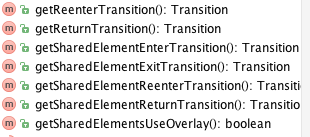Android 5.0动画(一)
2015-10-11 11:31
447 查看
先来说说android5.0中新增加的动画:
Touch feedback(触摸反馈)
Reveal effect(揭露效果)
Activity transitions(Activity转换效果)
Curved motion(曲线运动)
View state changes(视图状态改变)
Animate Vector Drawables(可绘制矢量动画)
接下来便按个介绍:
1-Touch feedback(触摸反馈)
最最明显的就是波纹动画了。当使用了Material主题之后,波纹动画会自动安装到所有的控件上面。当然,我们也可以设置了:
上面的第一种是设置波纹有边界,第二种是设置波纹超出边界。
这个动画还是比较简单的。
Reveal effect(揭露效果)
这个是啥意思呢。就是在控件要出现的时候,从某个点开始,慢慢的向周围扩散出现。听起来是不是有点像第一种动画。这里我就来说说他们的不同点,这种动画在刚开始的时候,视图是没呈现出来的,而第一种是呈现出来的。这就是区别,来个揭露效果的gif图(盗一张去)图片来源

如何使用?
从上面的使用来看,这个和我们以前的动画,使用起来没什么区别。
参数介绍:(把源码拿过来)
Activity Transitions(Activity转换效果)
要求使用Material主题
种类: 提供两种Transition类型:
1.Enter(进入):进入一个Activity的效果
2.Exit(退出):退出一个Activity的效果
3.reenter(从新进去)
4.return
普通的Transition
explode:从场景的中心移入或移出
silde:从场景的边缘移入或 移出
fade:调整透明度产生渐变效果
Shared Elements Transition 共享元素转换: 作用就是共享两个activity中共同的元素,
在android5.0下支持如下效果:
使用方法:
1.先允许使用
在xml中设置
上面 的那个@transition/tran 是个啥玩意。
在AS中,我们创建transition的XML文件就会在res下面生成transition的文件夹。

我们看下tran.xml
属性我也写出来的,重复的没写,无非就是时间,顺序,插值器,延迟等什么的。
或者在代码中设置
我们看下Window类的方法中提供了哪些


2.代码中设置动画
好。这种动画就介绍到这里
Curved motion(曲线运动)
在Material设计中的动画,依赖于曲线的时间插入值和空间运动模式。在android5.0(api21)及以上,可以自定义动画时间曲线和曲线运动模式。PathInterpolator类是一个新的基于贝塞尔曲线或路径对象的插入器。
系统提供了三种基本的曲线,XML资源:@interpolator/fast_out_linear_in.xml
@interpolator/fast_out_slow_in.xml
@interpolator/linear_out_slow_in.xml
我们可以看看系统的xml文件。
在src/interpolator下面
插入器指定了一个1 x1正方形运动曲线,它使用(0,0)为锚点,(1,1)为控制点。
…
在代码中我们可以这样
也可以这样
这是用了ObjectAnimator新增加的构造方法。
这个path是个什么玩意
path The
这个path就是前面2个值变化的’路线’。
Animate View State Changes 视图状态改变动画
使用方法;
1.代码中用:指定android:stateListAnimator=”@drawable/statechange” 属性
我们看看statechange.xml文件
一目了然。。
2.在代码中用
当你的主题继承了Material主题,按钮默认拥有了z动画。为了避免这种行为在你的按钮,设置android:stateListAnimator属性值为null。
AnimatedStateListDrawable 创建图片以显示关联view的状态改变动画。
res/drawable/
剩下的 下次再来说。。。
Touch feedback(触摸反馈)
Reveal effect(揭露效果)
Activity transitions(Activity转换效果)
Curved motion(曲线运动)
View state changes(视图状态改变)
Animate Vector Drawables(可绘制矢量动画)
接下来便按个介绍:
1-Touch feedback(触摸反馈)
最最明显的就是波纹动画了。当使用了Material主题之后,波纹动画会自动安装到所有的控件上面。当然,我们也可以设置了:
android:background="?android:attr/selectableItemBackground" android:background="?android:attr/selectableItemBackgroundBorderless"
上面的第一种是设置波纹有边界,第二种是设置波纹超出边界。
android:colorAccent:设置checkbox等控件的选中颜色
这个动画还是比较简单的。
Reveal effect(揭露效果)
这个是啥意思呢。就是在控件要出现的时候,从某个点开始,慢慢的向周围扩散出现。听起来是不是有点像第一种动画。这里我就来说说他们的不同点,这种动画在刚开始的时候,视图是没呈现出来的,而第一种是呈现出来的。这就是区别,来个揭露效果的gif图(盗一张去)图片来源

如何使用?
Animator animator = ViewAnimationUtils.createCircularReveal(Circularbutton, Circularbutton.getWidth()/2, Circularbutton.getHeight()/2, Circularbutton.getWidth(),0); animator.setInterpolator(new AccelerateDecelerateInterpolator()); animator.setDuration(5000); animator.start();
从上面的使用来看,这个和我们以前的动画,使用起来没什么区别。
参数介绍:(把源码拿过来)
@param view The View will be clipped to the animating circle. * @param centerX The x coordinate of the center of the animating circle, relative to * <code>view</code>. * @param centerY The y coordinate of the center of the animating circle, relative to * <code>view</code>. * @param startRadius The starting radius of the animating circle. * @param endRadius The ending radius of the animating circle.
Activity Transitions(Activity转换效果)
要求使用Material主题
种类: 提供两种Transition类型:
1.Enter(进入):进入一个Activity的效果
2.Exit(退出):退出一个Activity的效果
3.reenter(从新进去)
4.return
普通的Transition
explode:从场景的中心移入或移出
silde:从场景的边缘移入或 移出
fade:调整透明度产生渐变效果
Shared Elements Transition 共享元素转换: 作用就是共享两个activity中共同的元素,
在android5.0下支持如下效果:
changeBounds 改变目标实体的布局边界 changeClipBounds 裁剪目标视图边界 changeTransform 改变目标视图的缩放比例和旋转角度 changeImageTransfrom 改变目标图片的大小和缩放比例
使用方法:
1.先允许使用
在xml中设置
<resources> <!-- Base application theme. --> <style name="AppTheme" parent="android:Theme.Material"> <!-- Customize your theme here. --> <item name="android:listDivider">@drawable/diver</item> <!-- 是否开启tranition动画 --> <item name="android:windowContentTransitions">true</item> <!-- activity transition动画 --> <item name="android:windowEnterTransition">@transition/tran</item> <item name="android:windowExitTransition"></item> <item name="android:windowReenterTransition"></item> <item name="android:windowReturnTransition"></item> <!-- 共享元素切换动画 --> <item name="android:windowSharedElementEnterTransition"></item> <item name="android:windowSharedElementExitTransition"></item> <item name="android:windowSharedElementReenterTransition"></item> <item name="android:windowSharedElementReturnTransition"></item> </style> </resources>
上面 的那个@transition/tran 是个啥玩意。
在AS中,我们创建transition的XML文件就会在res下面生成transition的文件夹。

我们看下tran.xml
<?xml version="1.0" encoding="utf-8"?> <transitionSet xmlns:android="http://schemas.android.com/apk/res/android"> <explode android:duration="300" android:interpolator="@android:interpolator/accelerate_decelerate" android:matchOrder="0" android:startDelay="100" /> <changeBounds /> <changeTransform android:reparent="false" android:reparentWithOverlay="false"/> <changeClipBounds /> <changeImageTransform /> <slide /> <fade /> </transitionSet>
属性我也写出来的,重复的没写,无非就是时间,顺序,插值器,延迟等什么的。
或者在代码中设置
getWindow().requestFeature(Window.FEATURE_CONTENT_TRANSITIONS); super.onCreate(savedInstanceState); setContentView(R.layout.activity_main); getWindow().setEnterTransition(new Slide()); getWindow().setExitTransition(new Explode()); getWindow().setSharedElementEnterTransition(new Fade()); getWindow().setSharedElementExitTransition(new ChangeBounds()); /** * 还可以设置其他种类 */
我们看下Window类的方法中提供了哪些


2.代码中设置动画
Intent intent = new Intent(MainActivity.this,AnimationActivity.class); /** * 启动一般的transition */ startActivity(intent, ActivityOptions.makeSceneTransitionAnimation(MainActivity.this).toBundle()); /** * 启动一个共享元素 */ startActivity(intent,ActivityOptions.makeSceneTransitionAnimation(MainActivity.this,image,"sharename").toBundle()); /** * 启动多个共享的transition */ ActivityOptions options= ActivityOptions.makeSceneTransitionAnimation(MainActivity.this, Pair.create(image, "image"), Pair.create(paletteImage, "paletteImage")); startActivity(intent,options.toBundle());
好。这种动画就介绍到这里
Curved motion(曲线运动)
在Material设计中的动画,依赖于曲线的时间插入值和空间运动模式。在android5.0(api21)及以上,可以自定义动画时间曲线和曲线运动模式。PathInterpolator类是一个新的基于贝塞尔曲线或路径对象的插入器。
系统提供了三种基本的曲线,XML资源:@interpolator/fast_out_linear_in.xml
@interpolator/fast_out_slow_in.xml
@interpolator/linear_out_slow_in.xml
我们可以看看系统的xml文件。
在src/interpolator下面
<?xml version="1.0" encoding="utf-8"?> <!-- ~ Copyright (C) 2014 The Android Open Source Project ~ ~ Licensed under the Apache License, Version 2.0 (the "License"); ~ you may not use this file except in compliance with the License. ~ You may obtain a copy of the License at ~ ~ http://www.apache.org/licenses/LICENSE-2.0 ~ ~ Unless required by applicable law or agreed to in writing, software ~ distributed under the License is distributed on an "AS IS" BASIS, ~ WITHOUT WARRANTIES OR CONDITIONS OF ANY KIND, either express or implied. ~ See the License for the specific language governing permissions and ~ limitations under the License --> <pathInterpolator xmlns:android="http://schemas.android.com/apk/res/android" android:controlX1="0.4" android:controlY1="0" android:controlX2="1" android:controlY2="1"/>
插入器指定了一个1 x1正方形运动曲线,它使用(0,0)为锚点,(1,1)为控制点。
…
在代码中我们可以这样
animator.setInterpolator(new PathInterpolator(0.4f,0f,1f,1f));
也可以这样
ObjectAnimator mAnimator; mAnimator = ObjectAnimator.ofFloat(view, View.X, View.Y, path); ... mAnimator.start();
这是用了ObjectAnimator新增加的构造方法。
public static ObjectAnimator ofFloat(Object target, String xPropertyName, String yPropertyName,
Path path) {
PathKeyframes keyframes = KeyframeSet.ofPath(path);
PropertyValuesHolder x = PropertyValuesHolder.ofKeyframes(xPropertyName,
keyframes.createXFloatKeyframes());
PropertyValuesHolder y = PropertyValuesHolder.ofKeyframes(yPropertyName,
keyframes.createYFloatKeyframes());
return ofPropertyValuesHolder(target, x, y);
}这个path是个什么玩意
path The
Pathto animate values along.
这个path就是前面2个值变化的’路线’。
Animate View State Changes 视图状态改变动画
使用方法;
1.代码中用:指定android:stateListAnimator=”@drawable/statechange” 属性
我们看看statechange.xml文件
<?xml version="1.0" encoding="utf-8"?> <selector xmlns:android="http://schemas.android.com/apk/res/android"> <item android:state_pressed="true"> <set> <objectAnimator android:propertyName="translationZ" android:duration="200" android:valueTo="2dp" android:valueType="floatType"/> <!-- 其他的 --> </set> </item> </selector>
一目了然。。
2.在代码中用
button1.setStateListAnimator(AnimatorInflater.loadStateListAnimator(this,R.drawable.statechange));
当你的主题继承了Material主题,按钮默认拥有了z动画。为了避免这种行为在你的按钮,设置android:stateListAnimator属性值为null。
AnimatedStateListDrawable 创建图片以显示关联view的状态改变动画。
res/drawable/
<?xml version="1.0" encoding="utf-8"?> <animated-selector xmlns:android="http://schemas.android.com/apk/res/android"> <item android:id="@+id/pressed" android:drawable="@mipmap/ic_launcher" android:state_pressed="true"/> <item android:id="@+id/focus" android:drawable="@mipmap/ic_launcher" android:state_focused="true"/> <!-- other --> <transition android:fromId="@id/pressed" android:toId="@id/focus"> <animation-list> <item android:duration="20" android:drawable="@drawable/diver"></item> <!-- other items --> </animation-list> </transition> </animated-selector>
剩下的 下次再来说。。。
相关文章推荐
- 使用C++实现JNI接口需要注意的事项
- Android IPC进程间通讯机制
- Android Manifest 用法
- [转载]Activity中ConfigChanges属性的用法
- Android之获取手机上的图片和视频缩略图thumbnails
- Android之使用Http协议实现文件上传功能
- Android学习笔记(二九):嵌入浏览器
- android string.xml文件中的整型和string型代替
- i-jetty环境搭配与编译
- android之定时器AlarmManager
- android wifi 无线调试
- Android Native 绘图方法
- Android java 与 javascript互访(相互调用)的方法例子
- android 代码实现控件之间的间距
- android FragmentPagerAdapter的“标准”配置
- Android"解决"onTouch和onClick的冲突问题
- android:installLocation简析
- android searchView的关闭事件
- SourceProvider.getJniDirectories
